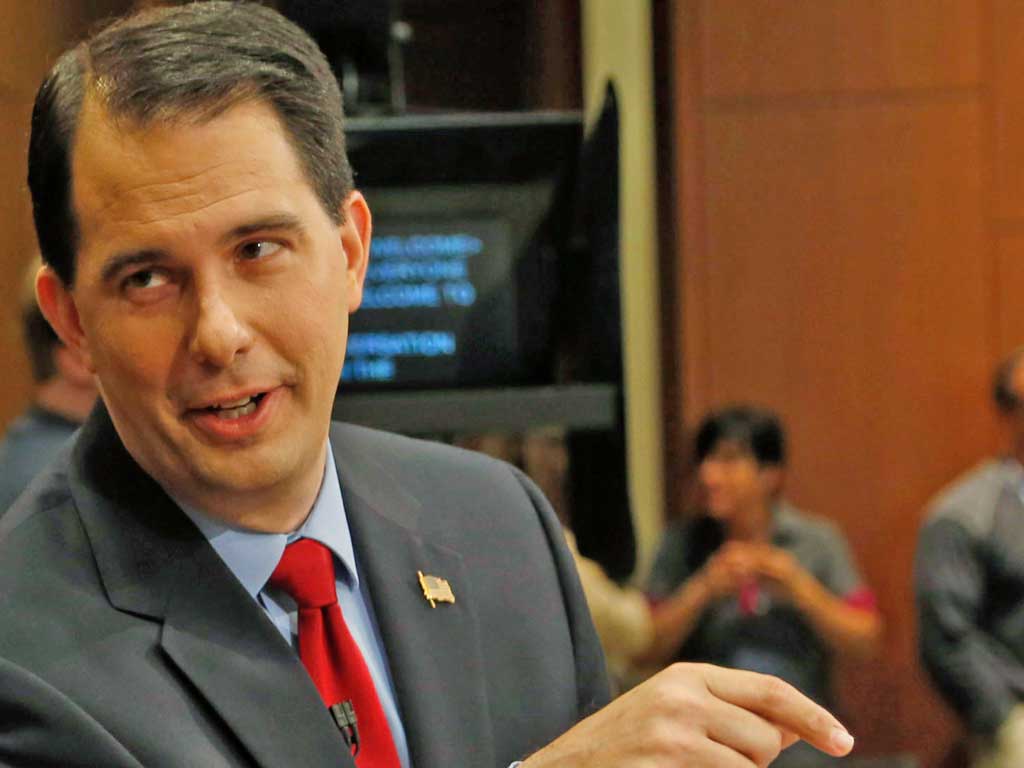Showdown in Wisconsin sets stage for presidential contest
A recall campaign against the state Governor is seen as a litmus test for Barack Obama and GOP tactics

The nasty showdown over union powers in Wisconsin that has been sending shudders across the American political landscape comes to a head today with voters determining whether the Republican Governor, Scott Walker, should be removed from office early or allowed to serve out his full term.
The recall campaign against Governor Walker, elected in 2010, was born of the backlash that followed his pushing through legislation early last year that stripped away collective bargaining rights from public workers and limited salary increases as a way to balance the state budget. While today's vote is technically a Wisconsin-only affair, the ramifications for the country and the presidential race could be profound.
Eve-of-voting polls showed Mr Walker holding a statistically insignificant lead over his Democrat challenger, Tom Barrett, the Mayor of Milwaukee.
Traditionally considered a progressive state, Wisconsin has been cleaved in two by a stand-off that in many ways is a microcosm of the national arguments that will dominate the race between Mitt Romney and President Barack Obama. Much of what divides the two men – the role of the public sector, safety nets and indeed of government itself – is encapsulated by the Wisconsin fight.
Mr Obama will not have been watching the returns last night – he was due to attend a "Barack on Broadway" fundraiser in New York – but the outcome will interest him intensely. A win by the well-funded Republican would raise doubts about his grip on Wisconsin, an absolute must-win state for him in November. In the 2008 election Mr Obama took Wisconsin, a pioneer of US workers' rights in the 20th century, by 15 points.
A last television debate ahead of today's vote saw the candidates offering slogans that seemed to fit exactly the template of the presidential race. Mr Barrett said Mr Walker's economic policies were "working for the wealthiest people in the state, but they're not working for the middle class".
The chairman of the Republican National Committee, Reince Preibus, said: "One thing is really clear here: if Walker wins on Tuesday, which we are really confident he will, Obama's going to have a much tougher road ahead in Wisconsin this fall. Certainly if Wisconsin goes red I think it's lights out for Barack Obama."
While prominent Republicans have campaigned for Mr Walker in Wisconsin, Mr Obama has conspicuously eschewed stumping for Mr Barrett, possibly sensing that coming out on the side of the unions may not sit well with independents in November.
The Milwaukee Mayor did get a fillip from a last-minute appearance last week by the former president Bill Clinton, who said economic health needed co-operation in the workplace. "Co-operation works. Constant conflict is a dead-bang loser and you need to get rid of it," he said. Mr Barrett, who lost the 2010 gubernatorial race to Mr Walker, has the support of most of the public sector and its unions.
A loss by Mr Barrett today would deal a psychological blow to Democrats nationally and lead to a rapid recalculation of which swing states Mr Obama, already in a tight race with Mr Romney, can realistically count on in November.
Subscribe to Independent Premium to bookmark this article
Want to bookmark your favourite articles and stories to read or reference later? Start your Independent Premium subscription today.

Join our commenting forum
Join thought-provoking conversations, follow other Independent readers and see their replies